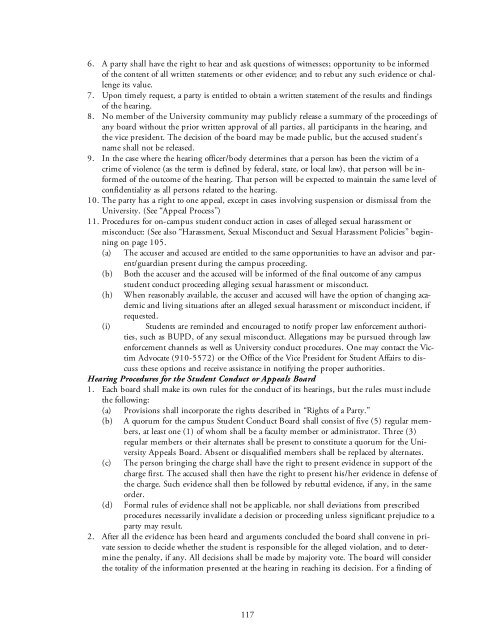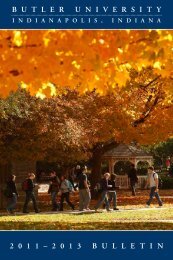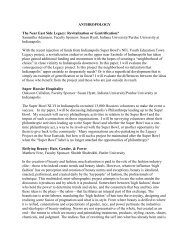Student Handbook - Butler University
Student Handbook - Butler University
Student Handbook - Butler University
You also want an ePaper? Increase the reach of your titles
YUMPU automatically turns print PDFs into web optimized ePapers that Google loves.
6. A party shall have the right to hear and ask questions of witnesses; opportunity to be informed<br />
of the content of all written statements or other evidence; and to rebut any such evidence or challenge<br />
its value.<br />
7. Upon timely request, a party is entitled to obtain a written statement of the results and findings<br />
of the hearing.<br />
8. No member of the <strong>University</strong> community may publicly release a summary of the proceedings of<br />
any board without the prior written approval of all parties, all participants in the hearing, and<br />
the vice president. The decision of the board may be made public, but the accused student's<br />
name shall not be released.<br />
9. In the case where the hearing officer/body determines that a person has been the victim of a<br />
crime of violence (as the term is defined by federal, state, or local law), that person will be informed<br />
of the outcome of the hearing. That person will be expected to maintain the same level of<br />
confidentiality as all persons related to the hearing.<br />
10. The party has a right to one appeal, except in cases involving suspension or dismissal from the<br />
<strong>University</strong>. (See “Appeal Process”)<br />
11. Procedures for on-campus student conduct action in cases of alleged sexual harassment or<br />
misconduct: (See also “Harassment, Sexual Misconduct and Sexual Harassment Policies” beginning<br />
on page 105.<br />
(a) The accuser and accused are entitled to the same opportunities to have an advisor and parent/guardian<br />
present during the campus proceeding.<br />
(b) Both the accuser and the accused will be informed of the final outcome of any campus<br />
student conduct proceeding alleging sexual harassment or misconduct.<br />
(h) When reasonably available, the accuser and accused will have the option of changing academic<br />
and living situations after an alleged sexual harassment or misconduct incident, if<br />
requested.<br />
(i)<br />
<strong>Student</strong>s are reminded and encouraged to notify proper law enforcement authorities,<br />
such as BUPD, of any sexual misconduct. Allegations may be pursued through law<br />
enforcement channels as well as <strong>University</strong> conduct procedures. One may contact the Victim<br />
Advocate (910-5572) or the Office of the Vice President for <strong>Student</strong> Affairs to discuss<br />
these options and receive assistance in notifying the proper authorities.<br />
Hearing Procedures for the <strong>Student</strong> Conduct or Appeals Board<br />
1. Each board shall make its own rules for the conduct of its hearings, but the rules must include<br />
the following:<br />
(a)<br />
(b)<br />
(c)<br />
(d)<br />
Provisions shall incorporate the rights described in “Rights of a Party.”<br />
A quorum for the campus <strong>Student</strong> Conduct Board shall consist of five (5) regular members,<br />
at least one (1) of whom shall be a faculty member or administrator. Three (3)<br />
regular members or their alternates shall be present to constitute a quorum for the <strong>University</strong><br />
Appeals Board. Absent or disqualified members shall be replaced by alternates.<br />
The person bringing the charge shall have the right to present evidence in support of the<br />
charge first. The accused shall then have the right to present his/her evidence in defense of<br />
the charge. Such evidence shall then be followed by rebuttal evidence, if any, in the same<br />
order.<br />
Formal rules of evidence shall not be applicable, nor shall deviations from prescribed<br />
procedures necessarily invalidate a decision or proceeding unless significant prejudice to a<br />
party may result.<br />
2. After all the evidence has been heard and arguments concluded the board shall convene in private<br />
session to decide whether the student is responsible for the alleged violation, and to determine<br />
the penalty, if any. All decisions shall be made by majority vote. The board will consider<br />
the totality of the information presented at the hearing in reaching its decision. For a finding of<br />
117
















